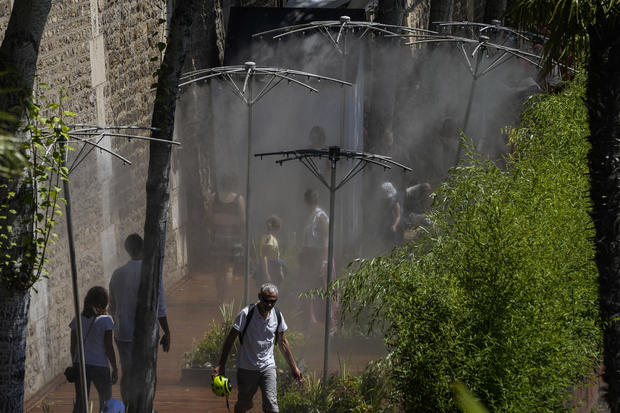Paris — As France swelters through its second heat wave this year, towns and villages across the country have decided to cancel their traditional Bastille Day fireworks displays, afraid they could spark fires.
At least 4,200 acres of forest had already been lost Wednesday to wildfires that broke out just a day earlier in the southwest near Bordeaux. More than 6,000 residents and tourists had to flee homes, hotels and campsites in the region as the fires raged. One of the blazes destroyed around 450 acres of old pine trees near Europe’s tallest sand dune, the Dune of Pilat.
As temperatures soar into the upper 90s across much of southern Europe, officials have warned that the high temperatures and a regional drought mean any stray spark could start a devastating blaze. Across the south of France, where several areas are on fire alert, many fireworks displays have been banned over the national holiday.
Fireworks displays are traditional on July 14, Bastille Day, but also July 13.Officials cancelled all public fireworks displays across the southern Var region, which is prone to summer forest fires, and also banned the use of personal fireworks between July 6 and July 20.
Temperatures across most of France have been in the 90s this week, and that is set to continue. Several places, including Paris, are expected to hit 100 degrees on Tuesday next week.
Some parks in the capital have been installing mist sprayers to help keep Parisians cool, and the temporary riverside beach that pops up along the River Seine in the capital also offers some welcome cooler air during the searing summer months.
French climate experts say there’s no doubt that climate change is behind the increase in the number and intensity of heat waves in the country. France’s meteorological service has measured heat waves since 1947, when there were two. It says they’ve become more frequent and more intense over the last two decades.
Between 1947 and 1991 there was average of two days of extreme temperatures per year. That rose to 6.2 days between 1992 and 2007, and then to 7.5 days between 2007 and 2021.
Of the 10 most intense heat waves to hit France since 1947, eight have been recorded since 2003, and 2019 went down as a particular scorcher with four separate heat waves.
This article was first published in CBS News . All contents and images are copyright to their respective owners and sources.













